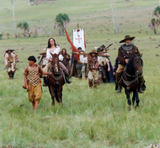Search Results
7/4/2025, 9:28:30 PM
>>212421789
True, the newly arrived European could not have the necessary sense of direction to venture into the unknown hinterlands. The compass, the map, the guiding eye of the Bandeiras was the native man. Without him, who knew the cardinal directions by the orientation of certain tree branches; who knew how to find food in roots and treat unknown diseases; who could detect the imperceptible signs of an invisible enemy tribe; without this living miracle of instinct and observation, the deeds of the bandeirantes would have been impossible. There would be no São Paulo without the Guaianá arrows that bravely defended Piratininga, without the Tupiniquim of São Vicente, without the Kaingang in Raposo Tavares' war against the Spaniards of Guayrá and Tape, without the Puri in the discovery of Minas Gerais, without the Kadiwéu in the Monções to Mato Grosso. The Indigenous people were the protectors of the bandeirantes. The vast territorial expanse of Paulistânia is their doing.
At the same time, the Portuguese man, since the beginning of our history, was the most passionate for the land, as if he himself were native, caring for it as their own home and treating the Caipira as their brothers. Their love for our battles, for our culture, for the prosperity of the land reflect the deeds of the Bandeirantes. The Iberian, the most intrepid of spirits, from their primordial adventures navigating the seas, since the first settlements in the land of São Vicente, maintained a defiant stance against authorities, against the imminent foreign threat; patriarch of the bandeirantes; who fought for the self-determination of our people until the very last moment.
Today, our history, which is Luso and Tupi, is being erased from our memories, rewritten as if it never happened. And it will fall to the few, the virtuous sons, to silently celebrate our past through the generations, and in our hearts, where their deeds will continue to live for all eternity.
True, the newly arrived European could not have the necessary sense of direction to venture into the unknown hinterlands. The compass, the map, the guiding eye of the Bandeiras was the native man. Without him, who knew the cardinal directions by the orientation of certain tree branches; who knew how to find food in roots and treat unknown diseases; who could detect the imperceptible signs of an invisible enemy tribe; without this living miracle of instinct and observation, the deeds of the bandeirantes would have been impossible. There would be no São Paulo without the Guaianá arrows that bravely defended Piratininga, without the Tupiniquim of São Vicente, without the Kaingang in Raposo Tavares' war against the Spaniards of Guayrá and Tape, without the Puri in the discovery of Minas Gerais, without the Kadiwéu in the Monções to Mato Grosso. The Indigenous people were the protectors of the bandeirantes. The vast territorial expanse of Paulistânia is their doing.
At the same time, the Portuguese man, since the beginning of our history, was the most passionate for the land, as if he himself were native, caring for it as their own home and treating the Caipira as their brothers. Their love for our battles, for our culture, for the prosperity of the land reflect the deeds of the Bandeirantes. The Iberian, the most intrepid of spirits, from their primordial adventures navigating the seas, since the first settlements in the land of São Vicente, maintained a defiant stance against authorities, against the imminent foreign threat; patriarch of the bandeirantes; who fought for the self-determination of our people until the very last moment.
Today, our history, which is Luso and Tupi, is being erased from our memories, rewritten as if it never happened. And it will fall to the few, the virtuous sons, to silently celebrate our past through the generations, and in our hearts, where their deeds will continue to live for all eternity.
6/25/2025, 1:14:06 AM
>>212087213
Segundo Euclides da Cunha a bandeira paulista é ‘a tradição heróica que constitui o único aspecto original da história brasileira’
Segundo Euclides da Cunha a bandeira paulista é ‘a tradição heróica que constitui o único aspecto original da história brasileira’
Page 1
